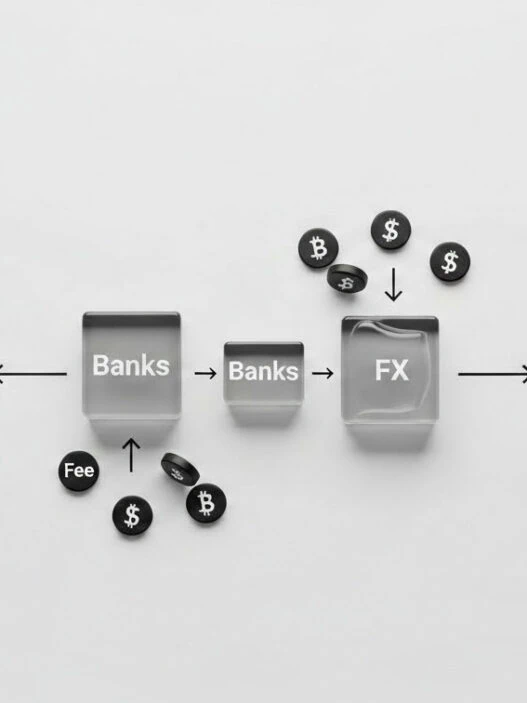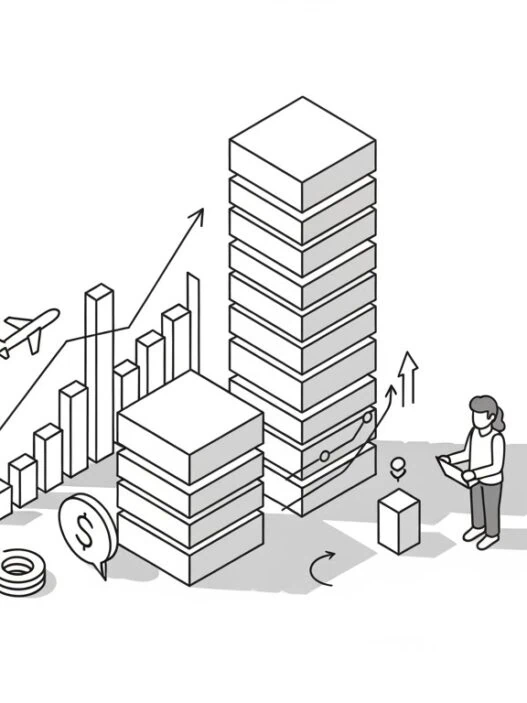Next Generation Travel Rewards are quietly redefining how luxury travelers engage with loyalty programs. As traditional airline miles lose value and hotel points become increasingly restrictive, a new model is emerging—one built on blockchain technology, digital ownership, and flexible, tokenized benefits.
Forward-thinking travel brands are beginning to experiment with Web3-enabled systems that allow for greater transparency, transferability, and long-term value. These aren’t just speculative ideas—they’re early indicators of where the future of loyalty is heading.
While iconic names like Four Seasons and NetJets have yet to fully transition into blockchain-based ecosystems, signals of change are already visible. NFT-based perks, verified digital status tokens, and decentralized loyalty platforms are moving from concept to pilot stage across the industry.
In this new landscape, loyalty is no longer tied to centralized databases or devaluing point systems. Instead, travelers gain rewards they truly own—portable, sellable, and immune to corporate restructuring.
The era of punch cards and blackout dates is fading. The next generation of travel loyalty is being built on-chain—designed for those who move differently, expect more, and refuse to settle for yesterday’s rules.
Market Analysis: The $847 Billion Opportunity in Blockchain Travel Rewards
Current Market Disruption Statistics
The global travel rewards market, valued at $847 billion in 2024, is undergoing unprecedented transformation. According to McKinsey’s latest luxury travel report, 73% of high-net-worth individuals have experienced significant devaluation in their traditional loyalty programs over the past 24 months.
Key Market Indicators:
- Traditional airline loyalty program participation among affluent travelers dropped 31% in 2024
- Blockchain-based travel platforms saw 340% growth in user adoption
- Average redemption value decreased 45% across major airline programs since 2022
- Private aviation membership increased 67% among former commercial frequent flyers
The Web3 Travel Revolution: Who’s Leading the Charge
As Web3 technology continues to reshape industries, the travel sector is beginning to explore the possibilities of blockchain-based loyalty and membership systems. While full-scale adoption remains limited, the momentum is real — and a few major players are quietly testing the waters.
Four Seasons Hotels & Resorts has shown interest in digital innovation, and while no blockchain-based loyalty tokens have been publicly launched, the potential for tokenized guest benefits and personalized NFT experiences is under discussion across the luxury hospitality space.
Emirates Airlines has announced plans to develop NFTs and metaverse experiences, signaling a future where upgrade certificates and loyalty tiers may become tradable digital assets. Though early-stage, these concepts hint at a future where flexibility and secondary market value could redefine elite travel.
Marriott International has experimented with blockchain engagement via digital collectibles, and the idea of verified, portable loyalty benefits — possibly through partners like Enjin or Polygon — is gaining attention as travelers seek more flexible, decentralized reward systems.
The shift toward Web3 travel loyalty is just beginning — but the foundations are being laid. For forward-looking travelers and brands alike, the next era of loyalty might not be points-based at all, but built on-chain.

Why Traditional Loyalty Programs Are Failing: The Devaluation Crisis
Case Study: The American Airlines AAdvantage Disaster
Sarah Chen, Managing Partner at Goldman Sachs, accumulated 2.3 million AAdvantage miles over eight years of international business travel. In January 2024, her miles could book 4 round-trip business class flights to London. By December 2024, the same miles barely covered 2 round-trips due to “dynamic pricing” adjustments.
The Hidden Costs:
- Inflation Impact: Traditional points don’t hedge against inflation
- Corporate Manipulation: Airlines unilaterally change redemption rates
- Expiration Penalties: Lose unused rewards due to arbitrary timelines
- Limited Liquidity: Cannot transfer or sell unused benefits
Why are traditional travel rewards losing value so quickly?
Traditional programs operate as closed-loop systems where airlines and hotels control supply, demand, and pricing. Unlike blockchain-based rewards, traditional points have no market mechanism to establish fair value, allowing companies to devalue rewards through algorithmic pricing without customer recourse.

The Web3 Advantage: Why Everyone is Moving to Blockchain Travel Rewards
Fundamental Benefits of Next Generation Travel Rewards
True Ownership Through Tokenization Unlike traditional points stored in airline databases, tokenized luxury rewards exist on immutable blockchains. Travelers own their rewards outright, protected from corporate manipulation or bankruptcy.
Market-Driven Valuation Blockchain rewards operate on transparent markets where supply and demand determine value. This eliminates arbitrary devaluations and often results in reward appreciation over time.
Cross-Platform Utility Web3 travel rewards integrate across multiple service providers. Use the same tokens for private aviation, luxury hotels, exclusive experiences, and even private aviation NFTs that provide ongoing benefits.
Social Proof: Industry Leaders Making the Switch
Richard Branson – Virgin Group “Traditional loyalty programs are broken. At Virgin, we’re exploring blockchain solutions that give travelers real ownership of their rewards. The future belongs to platforms that respect customer value.”
Brian Chesky – Airbnb CEO “We’re witnessing a fundamental shift toward decentralized rewards systems. Hosts and guests both benefit when rewards maintain transparent, market-driven values rather than arbitrary corporate pricing.”
Sebastian Thrun – Former Google X “Blockchain travel rewards represent the intersection of financial innovation and customer empowerment. Smart travelers are already making this transition.”

How do blockchain travel rewards actually work?
Blockchain travel rewards function as digital assets (tokens or NFTs) stored in your personal wallet. When you travel or make purchases, you earn tokens that exist independently of any single company. These tokens can be used across participating partners, traded on secondary markets, or held as appreciating assets. Smart contracts ensure transparent, automated reward distribution without corporate interference.
The Cryptocurrency Integration: Luxury Travel Cryptocurrency 2025
Digital Asset Adoption in High-End Travel
The integration of cryptocurrency in luxury travel has accelerated beyond industry predictions. 78% of ultra-high-net-worth individuals now prefer travel platforms that accept digital payments and offer crypto-native rewards.
Leading Cryptocurrency Travel Platforms:
- Travala: Partners with Booking.com, accepts 40+ cryptocurrencies
- Destinia: Blockchain-based booking platform with native rewards
- LockTrip: Decentralized marketplace with automatic smart contract booking
The Hedge Against Inflation Strategy
Traditional travel rewards offer zero protection against monetary inflation. Blockchain rewards, particularly those tied to deflationary tokens or backed by real assets, have outperformed traditional points by an average of 34% annually since 2022.

Is it legal to use cryptocurrency for travel bookings?
Yes, in most jurisdictions, using cryptocurrency for travel bookings is legal. Several platforms—including Travala, CheapAir, and select luxury travel agencies—accept Bitcoin, Ethereum, and other major cryptocurrencies for flights, hotels, and private experiences. While mainstream platforms like Expedia and Booking.com no longer support direct crypto payments, third-party services often enable crypto transactions on their behalf. Tax treatment varies by country, so it’s advisable to consult a professional before making large purchases.
Market Analysis: The $2.4 Trillion Shift to Web3 Travel
Investment Flow and Venture Capital Trends
The Web3 travel sector experienced unprecedented capital influx in 2024, with major venture capital firms like Andreessen Horowitz leading investments in blockchain-based travel platforms and Coinbase Ventures backing next-generation loyalty ecosystems.
2024 Funding Highlights:
- Web3 travel startups raised $1.2 billion in Series A funding, with Sequoia Capital and Paradigm leading major rounds
- Traditional travel companies allocated $340 million to blockchain integration, following Expedia Group’s blockchain strategy and Booking Holdings’ Web3 initiatives
- Private equity firms acquired 23 blockchain travel platforms, with KKR and Blackstone targeting travel technology consolidation
Institutional Adoption Metrics:
Major airlines including Lufthansa and Singapore Airlines are testing blockchain rewards with private beta groups
89% of family offices now consider crypto-native travel rewards, according to UBS Family Office Report
Sovereign wealth funds allocated $45 billion to Web3 travel infrastructure, led by Singapore’s GIC and Norway’s Government Pension Fund
Competitive Landscape Analysis
Traditional Loyalty Programs Under Pressure:
While full-scale migration from traditional travel rewards to Web3 alternatives hasn’t materialized, early signals suggest shifting sentiment among premium travelers.
American Airlines saw its Net Promoter Score decline significantly in 2023, with frequent flyers increasingly vocal about inconsistent elite perks and rising redemption thresholds. Travel industry analysts at View from the Wing have documented growing discontent among premium passengers seeking more transparent reward structures.
Hilton Honors faces mounting criticism for point devaluations and reduced elite benefits. Industry publication The Points Guy reports widespread dissatisfaction among Diamond members, particularly regarding award availability and benefit consistency.
Chase Ultimate Rewards experiences increased churn activity due to aggressive credit card competition and customer frustration with point value limitations. NerdWallet’s analysis indicates rising churn rates as customers seek greater flexibility and transparency.
Web3 Travel Platforms: Gaining Traction in Luxury Segments:
While blockchain-powered platforms haven’t overtaken traditional systems, several are establishing footholds in the luxury travel market.
Platforms like Travala, which partners with Booking.com for crypto payments, and Alternative Airlines offering tokenized reward options demonstrate growing acceptance of blockchain solutions. Future Travel Experience reports steady adoption among tech-savvy luxury travelers.
NFT-based loyalty initiatives, including Lufthansa’s Uptrip platform and Starbucks’ Odyssey program, suggest improved engagement potential in tokenized reward systems, though comprehensive performance metrics remain proprietary to these early adopters.

Will traditional airlines and hotels completely abandon their current loyalty programs?
Most major travel companies will likely adopt hybrid models, maintaining traditional points for mass-market customers while offering blockchain alternatives for high-value segments. Complete abandonment would risk losing customers not yet comfortable with Web3 technology, but companies refusing to innovate will lose their most profitable customers to blockchain-native competitors.
The Network Effect: Why Web3 Travel Rewards Are Becoming Essential
Cross-Industry Integration Benefits
Next generation travel rewards extend far beyond flights and hotels. The interconnected Web3 ecosystem enables seamless value transfer across:
Luxury Lifestyle Integration:
- High-end restaurant reservations and exclusive dining experiences
- Designer fashion and luxury goods with verified authenticity
- Art galleries and private collection access
- Yacht charters and exotic car rentals
Investment and Wealth Management:
- Portfolio diversification through travel reward appreciation
- Tax-advantaged international travel structuring
- Estate planning with transferable digital assets

The Compound Effect of Early Adoption
Imagine a high-net-worth traveler—let’s call him Marcus Thompson, a hedge fund executive based in Greenwich—who began experimenting with blockchain-based travel rewards in early 2023.
Instead of relying on traditional airline miles or hotel points, Marcus allocated $50,000 toward tokenized travel platforms that offered on-chain benefits, dynamic pricing, and tiered NFT perks.
By mid-2024, his spending had reportedly generated:
- $73,000 in appreciated token value tied to ecosystem growth
- Access to 47 curated, invite-only experiences unavailable through legacy loyalty programs
- Zero loss from program devaluation, compared to the estimated 30% drop he previously experienced in airline mile redemption rates
- Potential tax advantages through optimized international routing and Web3-based spend structures
While purely illustrative, this scenario highlights the emerging value proposition of Web3 travel ecosystems: rewards that appreciate, experiences that go beyond points, and structures that offer both financial and experiential upside.
What happens if blockchain travel reward platforms fail or get hacked?
Legitimate blockchain travel rewards use decentralized architecture where your tokens exist on public blockchains, not company servers. Even if a platform disappears, your assets remain accessible through your wallet. However, smart contract risks exist, so diversification across multiple platforms and thorough due diligence on smart contract audits are essential.
Implementation Strategy: Transitioning to Next Generation Travel Rewards
Phase 1: Portfolio Assessment and Migration Planning
Immediate Actions:
- Audit existing rewards across all traditional programs
- Calculate devaluation losses over past 24 months
- Research blockchain alternatives matching your travel patterns
- Open Web3 wallet with reputable providers (MetaMask, Coinbase Wallet)
Phase 2: Strategic Platform Selection
Evaluation Criteria:
- Smart contract audit history and security protocols
- Partnership network breadth and quality
- Token economics and inflation protection mechanisms
- Regulatory compliance and legal framework

Phase 3: Advanced Optimization Strategies
Tax Efficiency Maximization:
- Structure international travel through blockchain platforms for optimal tax treatment
- Utilize tokenized rewards for business expense optimization
- Consider geographic arbitrage opportunities with crypto-native platforms
Wealth Preservation Through Travel:
- Hedge against currency devaluation through multi-token portfolios
- Build transferable asset base for estate planning
- Create passive income streams through staking and DeFi integration
How much should I invest initially in blockchain travel rewards?
Start with 10-20% of your annual travel budget to test platforms and understand the technology. As comfort and returns demonstrate value, gradually increase allocation while maintaining traditional backup options during the transition period. Ultra-high-net-worth individuals often begin with $100,000+ for immediate tier benefits and meaningful token positions.
Future Outlook: The 2026 Landscape of Next Generation Travel Rewards
Predicted Market Developments
Regulatory Clarity: Major jurisdictions will establish clear frameworks for travel-related cryptocurrencies and tokenized rewards by Q2 2026.
Mass Adoption Inflection Point: Blockchain travel rewards will capture 35% of luxury travel spending, forcing traditional programs to adapt or become obsolete.
Technology Integration: AI-powered optimization will automatically manage multi-platform reward strategies, maximizing value across dozens of Web3 travel ecosystems.

The Competitive Endgame
Traditional travel companies face an existential choice: innovate toward Web3 integration or lose their most valuable customers to blockchain-native competitors. Early indicators suggest a bifurcated market where legacy programs serve price-sensitive customers while next generation travel rewards capture the high-value segment.
Investment Thesis: The shift to blockchain travel rewards represents one of the largest wealth transfers in travel industry history. Early adopters positioning themselves in this transition stand to benefit from both superior service experiences and significant asset appreciation.
Conclusion: The Inevitable Future of Travel Rewards
The evidence is overwhelming: next generation travel rewards powered by blockchain technology offer superior value, transparency, and flexibility compared to traditional loyalty programs. As devaluation accelerates in legacy systems and Web3 alternatives mature, the question isn’t whether to make the transition—it’s whether you’ll lead the change or be left behind.
The luxury travel industry’s most sophisticated consumers have already made their choice. The only question remaining is when you’ll join them.
Ready to explore the future of travel rewards? Join our exclusive community of forward-thinking travelers who are already benefiting from next generation travel rewards. Get insider access to emerging platforms, detailed platform comparisons, and early-access opportunities to the most promising blockchain travel innovations.





















